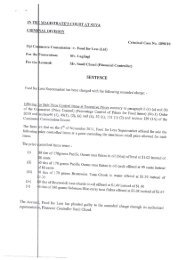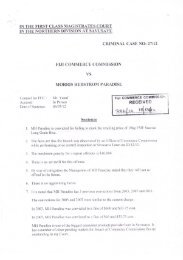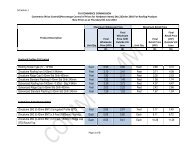PIB vs Vinod Prasad
PIB vs Vinod Prasad
PIB vs Vinod Prasad
Create successful ePaper yourself
Turn your PDF publications into a flip-book with our unique Google optimized e-Paper software.
Before: Chaitanya Lakshman<br />
Resident Magistrate<br />
For Prosecution: Mr Adesh Kumar<br />
Accused: Present<br />
For Accused: Mr. S Kumar<br />
Introduction<br />
IN THE FIRST CLASS MAGISTRATE’S COURT<br />
AT NAUSORI<br />
FIJI ISLANDS<br />
Criminal Case No: 85 of 2009<br />
PRICES & INCOMES BOARD (<strong>PIB</strong>)<br />
V<br />
VINOD PRASAD (F/N DAYA RAM)<br />
RULING ON NO CASE TO ANSWER<br />
The accused is charged (statement of offence) by the <strong>PIB</strong> for: "Failing to keep to the<br />
satisfaction of the Board such records: including letting agreement as it is customary and proper<br />
for the letting or continued letting of the said premises to which the Act applies. Contrary to<br />
Paragraph 4 of the Counter-Inflation (Notification of proposed increase in rent) Order Legal<br />
Notice 63 of 1996 and Section 30 (1) and 32 of the Counter Inflation Act, Cap 73."<br />
The particulars of the offence stated by <strong>PIB</strong> in the charge is that: "<strong>Vinod</strong> <strong>Prasad</strong> (f/n Daya<br />
Ram) did on the 15th day of August 2008 at Nausori in the Central Eastern Division being the<br />
Landlord of a residential premises failed to keep to the satisfaction of the Board such records<br />
including letting agreement in respect of his tenant Are Siri as it is customary and proper in<br />
respect of the letting or continued letting of the said premises under any tenancy to which the Act<br />
applies."<br />
The hearing for the case took place on 10th August 2009. The Prosecution called 3 witnesses. At<br />
the close of the prosecution case the Counsel for the accused submitted that there was no case to<br />
answer. The prosecution for its part stated that there was case to answer.<br />
The Law on No Case to Answer<br />
Section 210 of the Criminal Procedure Code provides that: "if at the close of the evidence in<br />
support of the charge it appears to the Court that a case is not made out against the accused<br />
person sufficiently to require him to make a defence, the Court shall dismiss the case and shall<br />
forthwith acquit the accused"<br />
In 1962, a Practice Note directed that in criminal cases:<br />
"A submission that there is no case to answer may properly be made and upheld (a) when<br />
there has been no evidence to prove an essential element in the alleged offence; (b) when
The Law<br />
the evidence adduced by the prosecution has been so discredited as the result of crossexamination<br />
or is so manifestly unreliable that no reasonable tribunal could safely convict<br />
on it. Apart from these two situations a tribunal should not in general be called upon to<br />
reach a decision as to conviction or acquittal until the whole of the evidence which either<br />
side wishes to tender has been placed before it. If however, a submission is made that<br />
there is no case to answer, the decision should depend not so much on whether the<br />
adjudicating tribunal (if compelled to do so) would at that stage convict or acquit but on<br />
whether the evidence is such that a reasonable tribunal might convict. If a reasonable<br />
tribunal might convict on the evidence so far laid before it, there is a case to answer."<br />
([1962] 1 All ER 448).<br />
The accused is charged with the offence contrary to paragraph 4 of the Counter-Inflation<br />
(Notification of Proposed Increase in rent) Order, 1996 [Legal Notice No. 63] and section 30 (1)<br />
and 32 of the Counter-Inflation Act (cap 73).<br />
Paragraph 4 of the Counter-Inflation (Notification of Proposed Increase in rent) Order, 1996<br />
[Legal Notice No. 63] dealing with Records provides that "any person or class of persons<br />
(including the State) shall keep to the satisfaction of the Board such records including letting<br />
agreements and or receipts as are customary and proper in respect of the letting or continued<br />
letting of the said premises under any Tenancy to which the Act applies."<br />
Section 30 (1) and 32 of the Counter-Inflation Act (Cap 73) respectively provide as follows: "a<br />
person who contravenes or fails to comply with any of the provisions of this Act or of any order,<br />
notice or requirement lawfully made or given thereunder shall be guilty of an offence." and<br />
"every person who commits an offence under this Act shall be liable on conviction to a fine not<br />
exceeding $2000.00".<br />
Paragraph 4 of the Counter-Inflation (Notification of Proposed Increase in rent) Order, 1996<br />
[Legal Notice No. 63] was included in addition to Section 25 of the Counter-Inflation Act, which<br />
provides that: "(1) every trader shall keep to the satisfaction of the Board such records and<br />
accounts, including stock and costing records, as are customary and proper in the type of<br />
business carried on by him, (2) The Board may, by notice in writing, direct any trader to keep<br />
such other records and accounts as are specified in the notice."<br />
The elements of the offence as per the charge laid by the Prosecution<br />
The elements of the offence that the prosecution needed to prove in order for it to prove the<br />
charge it laid against the accused was as follows:<br />
1. That it was <strong>Vinod</strong> <strong>Prasad</strong>, [identity of accused]<br />
2. who on the 15th day of August 2008, [date of offence]<br />
3. being a landlord of a residential premises at Nausori, [ownership of premises by the<br />
accused]<br />
4. failed to keep to the satisfaction of the Prices and Incomes Board such records,<br />
including letting agreements, [accused failed to provide letting agreement]
5. with respect of his tenant, Are Siri. [to the complainant]<br />
The elements of the offence as required by law<br />
1. an accused [identity of the accused]<br />
2. on a certain date [date of offence]<br />
3. being a land lord of a premises at Nausori [ownership of premises by the accused]<br />
6. failed to keep to the satisfaction of the Prices and Incomes Board such records,<br />
including letting agreements and or receipts, [accused failed to provide letting<br />
agreement and or receipts]<br />
The Evidence<br />
4. with respect to his tenant [to the complainant]<br />
The Complainant to the Board, Are Siri (the tenant) (PW-1) was the 1st prosecution witness. In<br />
his evidence in chief this witness positively identified the accused and told the Court that on 15th<br />
August 2008 he rented the house of the accused. This witness tendered a receipt to the court for<br />
the sum of $150.00 (exhibit 1) which he said was issued to him by the accused. He also told the<br />
Court that he had no written letting agreement with the accused but a verbal one.<br />
In cross examination PW-1 told the Court that he had a rent receipt and took the rent receipt as<br />
rent paid for 1 month. PW-1 also told the court that the agreement he had with the accused was a<br />
month to month agreement.<br />
The 2nd Prosecution witness was Mr Seru Lagilagi (PW-2) an Inspector of <strong>PIB</strong> (who told the<br />
Court his role was to police the Counter-Inflation Act and its regulations). This witness caution<br />
interviewed the accused. The accused spoke in Hindi in the interview. The caution interview is<br />
recorded in English by PW-2. According to PW-2 he questioned the accused in English this was<br />
translated by an Indian officer accompanying him. This officer according to PW-2 could speak in<br />
hindi, but could not write in Hindi.<br />
The tendering of the caution interview of the accused was not objected to by his Counsel.<br />
However, his counsel in his cross examination drew out the evidence that the prosecution did not<br />
properly interview the accused. The Court wishes to express its concern that basic rules and<br />
procedures have not been adhered to in interviewing the accused who spoke in vernacular<br />
(Hindi). The interview should have been recorded in vernacular as the accused understood<br />
vernacular. The questions should have been put to the accused in Hindi and the responses<br />
recorded in Hindi. The recorded questions and the responses of the accused should then have<br />
been translated into English and not in the manner as it was carried out by the two officers of<br />
<strong>PIB</strong>. The mode of questioning and recording of responses is not an acceptable procedure and the<br />
<strong>PIB</strong> officers are to refrain from conducting caution interviews in such a manner.<br />
PW-2 in cross examination told the court that Para 4 of the Counter-Inflation (Notification of<br />
Proposed Increase in rent) Order, 1996 [Legal Notice No. 63] to him meant that every landlord<br />
should provide tenancy agreement and receipt whether there is an increase or not.
The 3rd Prosecution witness was Selvin Ram (PW-3) a <strong>PIB</strong> Inspector. This witness told the<br />
Court that he accompanied PW-3 to investigate the complaint against the accused and was<br />
present when the caution interview was conducted by PW-2. In his evidence he told the court<br />
that the accused admitted that he failed to provide written letting agreement.<br />
Analysis<br />
This Court is mindful of Section 210 of the CPC.<br />
The Prosecution case focuses on the failure of the accused to keep records of a letting agreement.<br />
The prosecution acknowledges that the accused issued a receipt to the complainant, his tenant.<br />
The prosecution does not agree that the accused by issuing a receipt to his tenant is in<br />
compliance of the law. This is the reason the Court feels they charged him for breaching the law.<br />
The Court feels that the confusion on the part of the prosecution is largely due its interpretation<br />
of the law. The prosecution has charged the accused for failing to keep records of a letting<br />
agreement. The law provides that a landlord "shall keep to the satisfaction of the Board such<br />
records including letting agreements and or receipts". The defence argues that the accused<br />
provided a receipt.<br />
"and/or" - in the law<br />
The expression "and/or" has been in use in business documents for at least a century and half. Its<br />
meaning was discussed in Cuthbert v. Cummings (1855) 10 Exch 809, 156 ER 668. Viscount<br />
Simon in Bonitto v. Fuerst Bros [1944] AC 75 at 82, in discussing the confusion in the<br />
pleadings, spoke of "the repeated use of that bastard conjunction ‘and/or’ which has, I fear,<br />
become the commercial court’s contribution to basic English".<br />
In Cuthbert v. Cummings where a decision on a contract "to load a full and complete cargo of<br />
sugar, molasses, and/or other lawful produce" was required Alderson B held that "the parties<br />
were either (1) to load a full and complete cargo of sugar and molasses and other lawful produce<br />
or, (2) a full and complete cargo of sugar and molasses, or (3) a full and complete cargo of other<br />
lawful produce. This implied that a full and complete cargo of sugar alone or molasses alone<br />
would not have satisfied the contractual obligation."<br />
In Gurney v. Grimer (1932) 38 Comm Cas 7 at 13, Scrutton LJ considered the ordinary<br />
business meaning of "and/or", he stated that "there is really a clear understanding of what the<br />
words "and/or" mean. To take one of the simplest cases and an obvious case, where there is a<br />
charter party by which a ship is to proceed to Rotterdam and/or Antwerp at charterers option it<br />
means one of three things: the charterer may either send the vessel to Rotterdam alone or he may<br />
send her to Antwerp alone, or he may send her to Rotterdam and Antwerp."<br />
The law (Paragraph 4 of the Counter-Inflation (Notification of Proposed Increase in rent) Order,<br />
1996 [Legal Notice No. 63]) the accused is charged for breaching and in contention has been<br />
mentioned earlier and for ease of reference is being re-cited: "any person or class of persons<br />
(including the State) shall keep to the satisfaction of the Board such records including letting<br />
agreements and or receipts as are customary and proper in respect of the letting or continued<br />
letting of the said premises under any Tenancy to which the Act applies."
This Court interprets that this law requires any person or class of persons (including the State) to<br />
keep to the satisfaction of the Board such records including: either (1) letting agreements and<br />
receipts, or (2) letting agreements, or (3) receipts.<br />
The Court is of the view that if what the prosecution perceives is correct the drafters would<br />
simply have put the law as reading "… such records including letting agreements and receipts as<br />
are customary and proper in respect of the letting or continued letting…". If it was drafted as<br />
such the landlords would be required to provide both a letting agreement and a receipt. The law<br />
as it currently stands provides the landlord 3 options for the records that he is to keep, either 1)<br />
letting agreements and receipts, or (2) letting agreements alone, or (3) receipts alone.<br />
According to the prosecution the accused provided the tenant (the complainant) receipts. The<br />
accused had complied with the law. The receipt in this case is a record of the letting or continued<br />
letting of the premises.<br />
In passing the Court notes that the complainant sought refuge of the Board when things turned<br />
‘sour’ with his landlord. In the caution interview the Board put the allegation to the accused that<br />
he did not issue a receipt for the rental paid by the tenant and that he did not have a tenancy<br />
agreement. The accused stated in the interview that he issued receipts and he did not have an<br />
agreement. During the hearing the Prosecution on behalf of the Board tendered as evidence a<br />
receipt given to the complainant by the accused. Why would Board in the caution interview<br />
allege that the accused did not issue a receipt? The only inference this Court can draw is that the<br />
complainant might have told the Board that the accused was not issuing him receipts for his<br />
tenancy and based on that the accused was asked that he was not issuing receipts to the<br />
complainant. The Courts leaves it for the Board to enquire what the complainant told them.<br />
In light of the observations that this Court made it seeks that the Board be vigilant in its statutory<br />
role and that its officers comply with the procedures and rules for caution interviews. That<br />
investigation is properly conducted and people are only charged for breaching the law.<br />
The Court does not find that the accused has a case to answer. The case is dismissed.<br />
28 days to appeal.<br />
Chaitanya Lakshman<br />
Resident Magistrate<br />
NAUSORI<br />
09/09/09



![Prices and Income Board v Kelton Investment Ltd [2009] FJMC 2 ...](https://img.yumpu.com/51265192/1/190x245/prices-and-income-board-v-kelton-investment-ltd-2009-fjmc-2-.jpg?quality=85)












